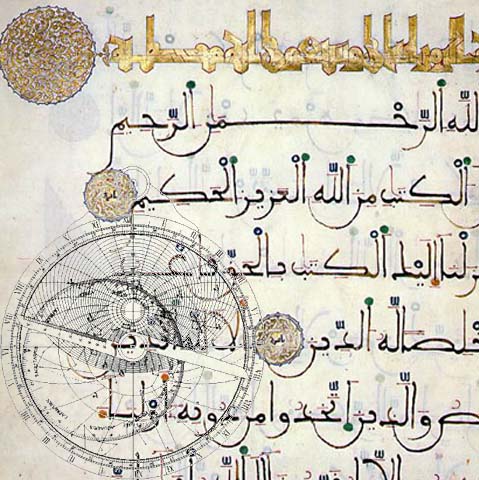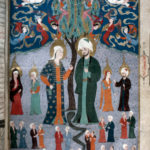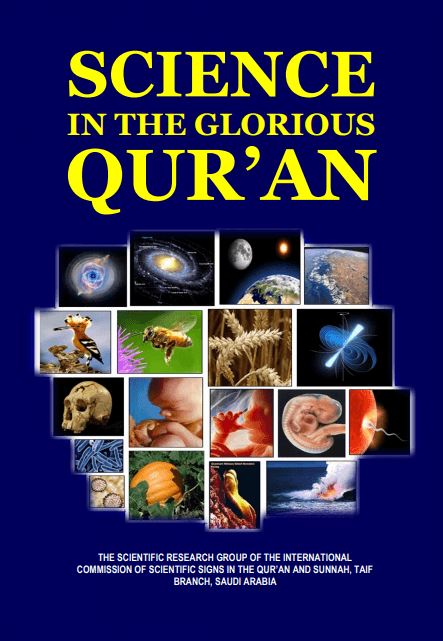
Since the 1967 (Six Day) War, which marks the beginning of the descent of the Arab public and elite into a collective delirium, I constantly posed these two questions to anyone I met: Why did Israel win the war? And why has the West progressed and the Muslims receded?
THE ANSWER I am given is mostly this: “The Jews defeated us because they held to their faith, and we were defeated because we dispensed with our faith and so God dispensed with us; now the West took their scientific knowledge from the Qur’ān while we did not, because our leaders deviated from God’s Law, so God punished them by veiling the secrets of the Qur’ān from them … The day when those who govern us apply the Sharī‘a we shall discover in the Qur’ān new sciences far in excess of what the West has taken from it.”
What I was hearing here, was in reality an echo of the responses that the religious discourse was giving to the two questions. If the Qur’ān is an encyclopædia of knowledge, so this response runs, then one must interpret religiously the backwardness of Muslims. One must consider Muslim backwardness to be a form of divine punishment for the ‘Disbelief’ of their rulers and their societies, which were not producing scientists capable of extracting from the Qur’ān scientific theories which would signal the resurgence of the Muslims. For Qur’ānic scientific truths must needs be in absolute accordance with all scientific truths. For what the latter merely achieves by research Islam achieves by revelation.
This accusatory discourse has been traded profitably by the Islamist movements to provoke Islamist revolution and incite others to declare the imitation of western modernity to be a form of Disbelief. For it is this imitation that has blinded us from discovering the sciences which God has set down in his Qur’ān.
Freeing the collective conscience from the myths of this demagogic discourse that is noxious to the future of science in Muslim lands, is a necessary step in order to hasten the ushering of Arab peoples into modernity, without which we will remain mere passive spectators of the progress of the rest of the peoples of the world. Hence the necessity to construct an intellectual, education and media discourse that offers the trainee and the general public alike a real analysis behind the actual fact of Israeli supremacy and western progress. Israeli supremacy cannot be ascribed to the Jews having held to their faith, since they are the least religious of the peoples of the Middle East. During the period of the Palestinian Mandate Moshe Dayan, the hero of the 1967 War, used to write ‘atheist’ in the box requesting ‘religion’ on his identity card. Indeed the most important reasons for their supremacy are to be ascribed to the standard of Israeli education which was excellent even before the establishment of their state.
The westerners did not take their secular sciences from the Qur’ān, but from the employment of rational rules to discover the rules of nature via the secular school which formed the manufacturing elite of this progress. They did not waste a single second in prattling on about proofs for the existence of God, nor in raving on about knowledge of the shortest way to secure for westerners their future life after death as the Islamic madrassas do! The backwardness of Muslims has nothing to do with their dispensing with their religion, but more precisely with pinning themselves down by it and exaggerating in it, by their turning it into a long list of fatwās prohibiting and criminalising the imitation of the Jews and the Christians in their institutions, their sciences, their values and their way of life. The fact is that the peoples who have been transported into modernity are those that have made the transition via this very ‘imitation’ of the Jews and the Christians.
The only way to escape this trap we have set for ourselves is to shatter the myth that “the Qur’ān is an encyclopaedia of science,” a myth that continues to form a mental obstacle preventing the intelligentsia from imitating the western scientific revolution, one which the intelligentsia of Japan, China, India, Southeast Asia and South America have reproduced … and have consequently extracted their peoples from scientific backwardness, the square root of all remaining aspects of backwardness.
To shatter the myth that the Qur’ān is an encyclopaedia of science requires a knowledge of its roots. In brief, after the conquest of the Middle East the Islamic elite entered into a bitter religious dispute with the Christian and Manichean elite. The Kalām[1] of the Mu’tazila, for instance, was conjured up originally to respond to the Christians and the Manicheans. Against these last a war of annihilation has been waged ever since the Caliphate of al-Mahdi! The Christians directed against the doctors of Islamic law and the Muslim Mutakallimūn an embarrassing question: Why did your Prophet not issue miracles such as those issued by Moses and Jesus? The Islamic élite improvised a two-fold reply to this:
Firstly: The creation of a host of miracles by the Prophet of Islam was not rejected, but the Qur’ān forbade them to him, recognising just the one miracle, the Qur’ān itself;

Suggested Reading
Secondly: The consideration that the miracle of the Qur’ān was in accordance with the sciences of the ancestors and the moderns. Fakhr al-Rāzī interpreted as ‘scientific’ the ‘scientific’ verses in the Qur’ān; Ibn Qayyim maintained the congruence of the Qur’ānic “embryology” with the embryology of the Greek doctor Galen (which is no longer congruent with modern embryology); al-Suyūtī composed the work Al-Iklīl fi Istinbāt al-Tanzīl (‘On Extracting Knowledge from the Revelation’) to establish that all science that exists is contained in the body of the Qur’ān. In his work: Al-Itqān fi ‘Ulūm al-Qur’ān (‘Mastering the Sciences of the Qur’ān’) he devoted a whole section to ‘sciences extracted from the Qur’ān’, and states there:
As for the types of sciences (in the Qur’ān) there is no chapter nor issue that the Qur’ān does not give indications of.[2]
Since the 19th century, when the Muslims finally recognized their decline, they have legislated to exonerate the Qur’ān from responsibility for this decline, which they instead ascribed to the Muslims’ abandonment of the Qur’ān. The ‘resurgence’ led by al-Afghānī and ‘Abduh was, in reality, a defence of this exoneration of Islam for the Muslims’ decline. Recently the scientific interpretation of the Qur’ān has returned in an even more raving form. Perhaps the most influential of this rehashed ‘scientific’ interpretation is Tantāwī Jawharī’s Al-Jawāhir fi Tafsīr al-Qur’ an al-Karīm (‘Gems in the Interpretation of the Noble Qur’ān’) where the author makes claim to the existence of ‘nuclear science’ in the Qur’ān. This interpretation is the ultimate source of the myth now pervasive today – that the Qur’ān is an encyclopaedia of science – and it has subsequently been seized upon by many authors such as Muhammad Sulaymān in his work The Qur’ān and Science and many other authors both before him and after him, in addition to some Islamist doctors. There is no doubt that the repetition of the description of the divinity in the Qur’ān that he is li-kulli shay’in ‘alīm (“in all things wise”) has strengthened belief in this myth; for how can God, who is in all things wise, not know the truths of science?
Muhyī al-Dīn Yahyā, professor at the Dār al-Hadīth al-Hussayniyya in Rabat, and specialist in classical Islamic law and thought, noted in an essay for the Dictionary of the Qur’ān on ‘science’ in the Qur’ān, that
the Qur’ān never employed the plural (‘ulūm’) by which subsequently ‘the sciences’ are exclusively known, which is a sufficient indication of the difference between Qur’ānic science and sciences subsequently distributed among the independent scientific disciplines. Thus the Qur’ān does not disdain any knowledge that can be deduced from ancient peoples or from natural phenomena. It just views their benefits only in terms of spiritual salvation. Indeed the Qur’ān warns believers of the hidden dangers lurking in the physical sciences.[3]
[1] Kalām (‘Ilm al-Kalām) denotes scholastic theology, the discipline of seeking theological principles through dialectic, that is, the seeking of philosophical demonstrations to confirm religious principles. The ‘Ilm al-Kalām developed as a rational theology, practiced by mutakallimīn. Its place in Islamic history is controversial, and modern Salafi scholars outlaw it. (Ed.)
[2] Vol II, p.129.
[3] معجم القرآن, p.799. Author’s note: “This is published in French by specialist in law and tafsīr Muhammad ‘Alī Amīr Mu‘izzī. It is an important dictionary that awaits a benefactor to fund its translation into Arabic.”

